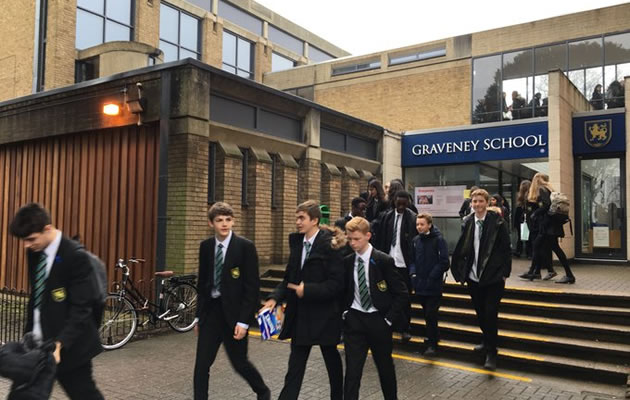Ex-Pupils Allege Racism at Graveney School
Instagram account details instances of discrimination and lack of support

Picture: Graveney School (Twitter)
July 20, 2020
Ex-students at Graveney School in Tooting have set up an Instagram account detailing incidents of alleged racism and discrimination at the prestigious school.
In the wake of the death of George Floyd at the hands of a police officer in the United States and the Black Lives Matter protests across the globe, students began to anonymously share their experiences of alleged discrimination online on the Instagram account, Graveney Stories of Racism.
It currently has more than 1,800 followers on the social media site and includes allegations about the lack of support Black and Asian students given when other students made racist remarks.
One said, “I was probably one of the first few refugee kids that joined the school. As in fresh to the country. I didn’t have it as bad as it could have been but I was definitely bullied for it for a long time. Got called terrorist A LOT. Got bullied about my language skills. Got asked if Bin Laden is related to me etc. Now looking back at it, I’m astonished to think there was zero support for a student like me.”
Another said that when a fellow pupil asked “why don’t you just go back to your country”, a teacher told them “to be the bigger person and to grow up.”
In response to the allegations Graveney School has set up a ‘change council’ to combat “wider social inequalities.”
Acting Principal Cynthia Rickman said in a statement: “As a school we are fully committed to doing whatever we can to help combat wider societal inequalities.
“We have set up a change council to review all major aspects of school life so that we better understand where there may be systems or processes that could potentially result in unequal opportunity for disadvantaged groups within our own community.
“Our overriding aim is to identify where there may be the potential for bias or any actions that could otherwise undermine our anti-discriminatory principles and to ensure that as a school community we take the necessary steps to make sure every one of us feels equally valued, equally respected and equally treated.”
Students have presented Graveney School with a list of eight changes they want to see enacted in the school.
These include a restructuring of the school’s setting system to “promote diversity within forms and classes”, forums for students to discuss topics such as prejudice and discrimination, cultural and religious training for staff and decolonising the curriculum.
One campaign member said: “The volume of stories we received allowed us to identify some of the root causes of racism and discrimination within the school. Many of these stories highlighted the problems within the streaming system used by Graveney, which creates a clear racial divide amongst students.”
The group says it feels it has made progress on several points with the school, but argues that the change council “is simply the school’s attempt to make the issue go away without making any real changes.”
“We hope that this meeting marks what will only be the beginning of an open dialogue about making positive changes within the school,” they said.
They are now pushing ahead with a petition calling on changes to the streaming system at the school to focus on SAT results rather than interviews and 11+ exam results.
The petition currently has 1,426 signatures.
Graveney currently admits 280 pupils a year, of which 70 places are allocated to applicants with the highest scores in the Wandsworth Year 6 Test.
The school’s partially-selective system has caused controversy over the years, with some groups demanding for it to be removed completely, while others, including Conservative-led Wandsworth Council, have championed the system.
They have argued it allows students from poorer areas to attend the school, and removes “selection by house price.”
Graveney School’s new ‘change council’ is currently consulting with the school’s community through focus groups and will continue throughout the school year 2020/2021.
The governor’s monitoring committee will receive reports twice each term and to the full governing body at each of its termly meetings.
Parents and the wider community will be kept in touch with progress and students will be updated via assemblies and reports back from members of the school council.
Sian Bayley - Local Democracy Reporter
Related links
|
Wandsworth Schools Ranked By Attainment Wandsworth Council Make Over £50,000 Advertising Private Schools Register for your newsletter from: |